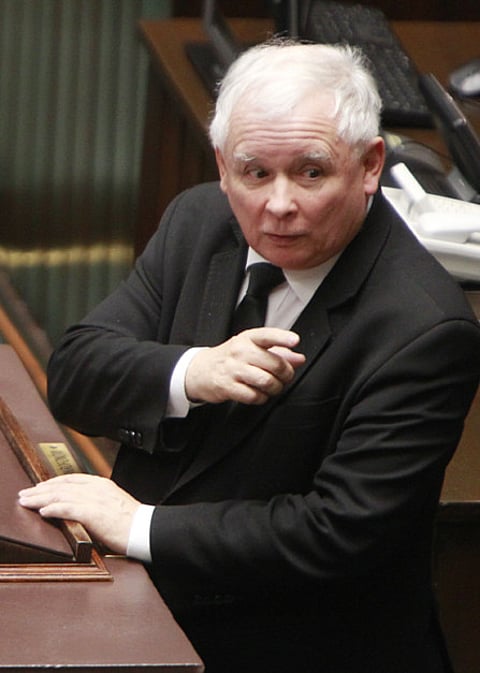The West’s other Trump
Jaroslaw Kaczynski’s anti-Tusk crusade in Poland foreshadows what life would be like in the US if the Republican presidential candidate were to win

In the second American presidential debate, Republican candidate Donald Trump promised that, if elected, he would appoint a special prosecutor to investigate Democratic candidate Hillary Clinton. “You’d be in jail,” Trump told her.
Trump’s threat to politicise the justice system has received the backlash that it deserves; but, sadly, his cynicism is not unique to the United States. The current Polish government, led by the Law and Justice (PiS) party, which came to power just under a year ago, has displayed a similar authoritarian streak, flouting legal conventions to further its own ends.
PiS leader Jaroslaw Kaczynski has repeatedly called for an inquiry into former Polish prime minister and current European Council President, Donald Tusk. Kaczynski holds Tusk’s former government partially responsible for the April 2010 plane crash in Smolensk, Russia, which killed 96, including Kaczynski’s twin brother, Polish President Lech Kaczynski. The Polish government delegation was travelling to a commemoration of the 1940 massacre in Katyn, where Stalin had ordered the murder of 22,000 Polish army officers, police officers and intelligentsia and blamed Adolf Hitler for the crime. When the Cold War ended, the truth about the massacre finally came out and was officially recognised by former Russian president Boris Yeltsin.
Jaroslaw Kaczynski and other PiS members maintain that Russia — with help from some Polish officials — was responsible for the plane crash, too. They have relied on this bizarre conspiracy theory in their rise to power, despite having no evidence to support it. Indeed, transcripts from the plane’s recovered cockpit voice recorder indicate that the plane crashed during a bad-weather landing.
Armed with his conspiracy theories, Kaczynski wants to deny Tusk a second term at the helm of one of the European Union’s (EU) three main governing institutions, saying, “Should such a person be at the head of the European Council? I have profound doubts.” Meanwhile, Poland’s right-wing media has fanned the flames, with one magazine recently depicting Tusk in handcuffs.
Kaczynski’s anti-Tusk crusade is a Trump-worthy abuse of political power that foreshadows what life would be like for Trump’s political opponents if he were actually to win. It also reflects a broader, raging battle for Poland’s soul.
Poland was once Central Europe’s post-Cold War democratic poster child. But now, the PiS is pursuing a wide-ranging power grab, seeking control of the country’s constitutional court, public media channels and security services. Instead of cementing Poland’s strategic importance to Nato and its rightful place as a powerful, respected EU member-state, the PiS has become obsessed with reversing modernity. As proof, one need look no further than the government’s assault on its own judiciary and democratic institutions, which is raising eyebrows in the US, Brussels and across Europe.
Poland is experiencing a constitutional crisis that began when PiS-backed Polish President Andrzej Duda refused to swear in three Constitutional Tribunal judges chosen by the previous parliament. The PiS then selected its own judges instead, while adopting legislation that essentially paralysed the court. The court declared the PiS’s judicial rule changes unconstitutional, but the PiS-led government refused to publish the court’s decision, thereby blocking it from taking effect. It is now all but impossible for the court to assess the constitutionality of the current parliament’s legislation, despite the Polish constitution’s explicit provision authorising judicial review.
Now that the PiS’s actions have been universally condemned, it is holding out until the end of the year, when the current constitutional court president’s mandate expires. After that, the PiS will appoint a friendlier president, who will no doubt dance to whatever tune it plays. But a newly appointed president likely won’t end Poland’s constitutional crisis, because with valid court judgements from this summer remaining unpublished, there is now a black hole in Poland’s constitutional order.
The EU has started legal proceedings against Poland and it is calling on the Polish government to work with opposition parties to reform the court. If Poland doesn’t comply, the EU could ultimately strip it of its voting rights. But it is unlikely that the EU or other international bodies will ensure a solution to the Polish political problem. Only Poles can do that.
In fact, huge protests against a recent bill that would have banned virtually all abortions (under penalty of imprisonment for up to five years) forced the government to back down and withdraw the proposed legislation. This marked a victory for Polish women and it suggests that Poland is more progressive than Kaczynski would like to believe. Still, while the government may have suffered one major public defeat, the PiS’s underlying ideological illiberalism remains intact. That means Polish civil-society advocates will have to fight many more battles in the coming months to contain and reverse the PiS’s lawlessness.
— Project Syndicate, 2016
Guy Verhofstadt, a former Belgian prime minister, is president of the Alliance of Liberals and Democrats for Europe Group in the European Parliament.


